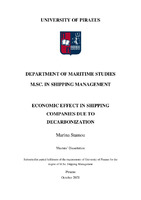Economic effect in shipping companies due to decarbonization

Master Thesis
Συγγραφέας
Stamou, Marina
Στάμου, Μαρίνα
Ημερομηνία
2021-10Επιβλέπων
Polemis, DionisiosΠολέμης, Διονύσιος
Προβολή/
Περίληψη
Τα τελευταία χρονιά πολλοί οργανισμοί έχουν ευαισθητοποιηθεί και έχουν τονίσει την ανάγκη που υπάρχει για προστασία του περιβάλλοντος. Ο Διεθνής Ναυτιλιακός Οργανισμός (ΙΜΟ), ως παγκόσμιος ρυθμιστή της ναυτιλιακής βιομηχανίας, έχει προσπαθήσει να θεσπίσει κανονισμούς, οι όποιοι θα βοηθήσουν στη μείωση ρύπανσης του περιβάλλοντος από τη ναυτιλία. Γι’ αυτό τον λόγο, η Επιτροπή Προστασίας Θαλασσίου Περιβάλλοντος (MEPC) του IMO αποφάσισε να θέσει ως στόχο τη μείωση της έντασης των εκπομπών αερίων ρύπων, συγκεκριμένα του άνθρακα, κατά 40% έως το 2030 και κατά τουλάχιστον 50% έως το 2050 κάνοντας τους εμπλεκόμενους να θέλουν να βρουν μια μακροπρόθεσμη λύση και όχι κάτι προσωρινό.
Η πορεία προς την απανθρακοποίηση είναι μια σύνθετη διαδικασία που επηρεάζει όλους τους εμπλεκομένους και όχι μόνο τους εφοπλιστές, καθώς για τα καύσιμα και την ποιότητα τους υπεύθυνοι είναι οι παραγωγοί και προμηθευτές, για τις μηχανές και τις νέες τεχνολογίες την ευθύνη έχουν οι κατασκευαστές και τα ναυπηγία. Χωρίς σημαντικές επενδύσεις στην Έρευνα και Ανάπτυξη από αυτούς τους εμπλεκόμενους φορείς, η ναυτιλιακή βιομηχανία θα παραμείνει εξαρτημένη από τον άνθρακα
Συνοψίζοντας, οι ναυτιλιακές εταιρίες καλούνται να επιλέξουν τη βέλτιστη, κατά τη γνώμη τους λύση, ώστε να πετύχουν αυτό το στόχο. Η παρούσα διπλωματική εργασία έχει σαν σκοπό την ανάλυση του αποτυπώματος του άνθρακα της ναυτιλίας και θα αναλυθούν κάποιες απ’ τις διαθέσιμες επιλογές που έχουν οι πλοιοκτήτες όπως το LNG, το υδρογόνο και η αμμωνία.


